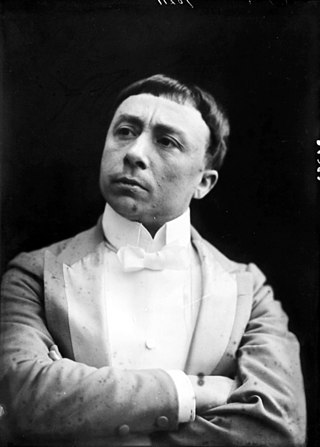Top Qs
Timeline
Chat
Perspective
Nicola Maldacea
Italian actor From Wikipedia, the free encyclopedia
Remove ads
Nicola Maldacea (29 October 1870 – 5 March 1945) was an Italian actor, comedian and singer, well-known for his expertise in the theatrical genre of 'macchietta', where he was one of the pioneers.[1][2] In the golden years of the café-chantant in Italy, between 1890 and 1920, Maldacea was the star who closed the show together with the prime donne who symbolised the belle époque such as Lina Cavalieri or La Belle Otero. He sang duets with national and international stars, such as Emilia Persico (it), Amina Vargas, Eugénie Fougère, La Tortajada, Lucy Nanon, and above all with the Neapolitan Amelia Faraone (it), but also led his own theatre companies.[1]
Remove ads
Career
Summarize
Perspective

Born to an elementary schoolteacher with origins in Cosenza, Nicola Maldacea embarked upon his theatrical career in his hometown, making his debut at a very young age on the stages of variety shows and café-chantants.[3]
Possessing a robust vocal prowess, Maldacea initiated his career as a canzonettista (a traveling singer of popular songs), performing in venues across the province of Naples.[3] This eventually led him to write for theatrical companies helmed by Eduardo Scarpetta and Gennaro Pantalena, affording him the opportunity to gain recognition and eventually play at the Salone Margherita (it) in Naples.[1][4]
The recitative style he adopted during his performances prompted Maldacea to provide a satirical interpretation conducive to caricaturing the characters he embodied. This gave birth to the macchiette genere, which Maldacea himself described as follows:[5]
Like a draftsman, I committed myself to give the audience an immediate impression by sketching the character, marking it quickly, highlighting its distinctive features. Hence the origin of the word 'macchietta,' which belongs to the figurative arts: a hasty sketch that, with a few strokes, conveys a place or a person in such a way as to provide an effective impression with the utmost caricatural spontaneity.
— Nicola Maldacea[5]
In this context, critical reception leaned toward favorability praise. The Gazzetta Musicale di Milano (Musical Gazette of Milan), published by Ricordi in December 1903, rendered the following portrayal:[6]
Macchietta is no easy feat: it requires keen powers of observation and intuition, a sense of proportion, and perfect elocution. Maldacea on stage is a living cinematograph: he is the caricaturist and the caricature. [...] The only true type for reproducing the macchietta, [...] the voice, the stage, the meticulously precise study in imitating, in the smallest details, the character he embodies; prodigious speed in changing makeup, clothing, accessories: in short, he is a masterful transformist, like Fregoli, a consummate monologist.
— Gazzetta Musicale di Milano (1903)[6]
In the era preceding the outbreak of the First World War, Maldacea garnered acclaim within the theaters Southern and Northern Italy, solidifying his status as one of the preeminent comedy actors in the country.[1] Among his most renowned portrayals were characters and macchiette such as "Il Conte Flick", "'O jettatore", "il Superuomo", "'O Rusecatore" and "l'Elegante" with music composed by Vincenzo Valente and Salvatore Gambardella. These macchiette were frequently written by authors such as Salvatore Di Giacomo, Trilussa, Rocco Galdieri, and others, who frequently wrote specifically for Maldacea.[7]
He also appeared in cinema, in more than sixty films from 1935 to 1956.
Maldacea passed away in Rome on March 5, 1945.[4] The city of Naples transferred his remains from Rome to the Cemetery of Poggioreale, Naples.[2]
Remove ads
Selected filmography
Remove ads
References
External links
Wikiwand - on
Seamless Wikipedia browsing. On steroids.
Remove ads

